Heterorhabditis bacteriophora Extracellular Vesicles Alter the Innate Immune Signaling in Drosophila melanogaster
- PMID: 40565505
- PMCID: PMC12191515
- DOI: 10.3390/genes16060613
Heterorhabditis bacteriophora Extracellular Vesicles Alter the Innate Immune Signaling in Drosophila melanogaster
Abstract
Background:Heterorhabditis bacteriophora entomopathogenic nematodes are commonly used in agricultural practices for the biological control of insect pests. These parasites are also used in basic research for unveiling the molecular basis of nematode parasitism in relation to the insect anti-nematode response. We have recently shown that H. bacteriophora excreted-secreted products reduce the expression of the antimicrobial peptide gene Diptericin in Drosophila melanogaster, which increases fly mortality due to enhanced propagation of the mutualistic bacteria Photorhabdus luminescens. However, the effect of entomopathogenic nematode extracellular vesicles (EVs) on the insect host defense remains unknown. Methods: Here, we injected adult flies with H. bacteriophora EVs and used quantitative RT-PCR together with gene-specific primers to analyze the activity of immune-related signaling pathways. Results: We found that H. bacteriophora EVs are lethal to Drosophila melanogaster, and they downregulate the expression of Attacin, Cecropin, and Prophenoloxidase 3 in adult flies. Conclusions: These findings build on previous knowledge and strengthen the notion that H. bacteriophora entomopathogenic nematodes release a variety of effector molecules to modify the insect's innate immune signaling. This information is important because it contributes toward clarifying the molecular interplay between entomopathogenic nematode components and the host's innate immune system.
Keywords: Drosophila; Heterorhabditis; immune gene expression; immune signaling; infection; innate immunity.
Conflict of interest statement
The authors declare no conflicts of interest.
Figures



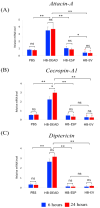
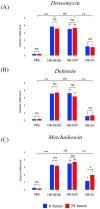
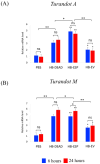
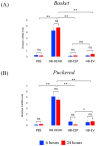

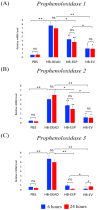

References
MeSH terms
Substances
Grants and funding
LinkOut - more resources
Full Text Sources
Molecular Biology Databases

